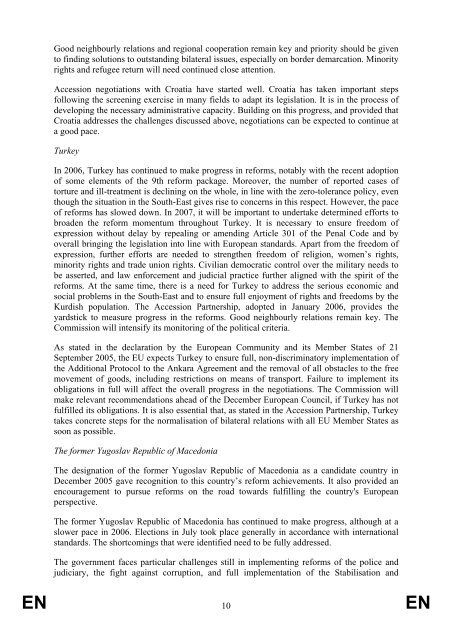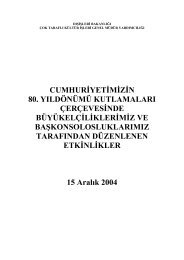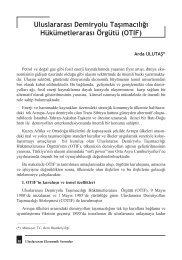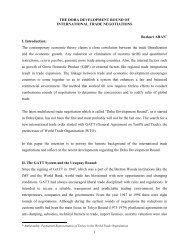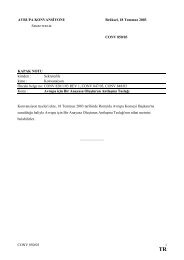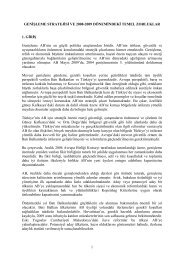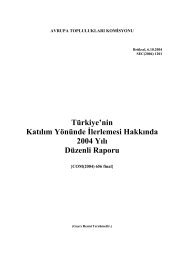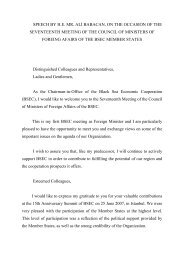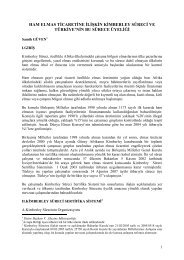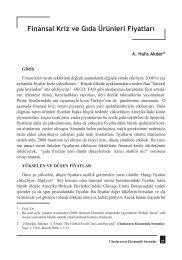Enlargement Strategy and Main Challenges 2006 - 2007
Enlargement Strategy and Main Challenges 2006 - 2007
Enlargement Strategy and Main Challenges 2006 - 2007
You also want an ePaper? Increase the reach of your titles
YUMPU automatically turns print PDFs into web optimized ePapers that Google loves.
Good neighbourly relations <strong>and</strong> regional cooperation remain key <strong>and</strong> priority should be given<br />
to finding solutions to outst<strong>and</strong>ing bilateral issues, especially on border demarcation. Minority<br />
rights <strong>and</strong> refugee return will need continued close attention.<br />
Accession negotiations with Croatia have started well. Croatia has taken important steps<br />
following the screening exercise in many fields to adapt its legislation. It is in the process of<br />
developing the necessary administrative capacity. Building on this progress, <strong>and</strong> provided that<br />
Croatia addresses the challenges discussed above, negotiations can be expected to continue at<br />
a good pace.<br />
Turkey<br />
In <strong>2006</strong>, Turkey has continued to make progress in reforms, notably with the recent adoption<br />
of some elements of the 9th reform package. Moreover, the number of reported cases of<br />
torture <strong>and</strong> ill-treatment is declining on the whole, in line with the zero-tolerance policy, even<br />
though the situation in the South-East gives rise to concerns in this respect. However, the pace<br />
of reforms has slowed down. In <strong>2007</strong>, it will be important to undertake determined efforts to<br />
broaden the reform momentum throughout Turkey. It is necessary to ensure freedom of<br />
expression without delay by repealing or amending Article 301 of the Penal Code <strong>and</strong> by<br />
overall bringing the legislation into line with European st<strong>and</strong>ards. Apart from the freedom of<br />
expression, further efforts are needed to strengthen freedom of religion, women’s rights,<br />
minority rights <strong>and</strong> trade union rights. Civilian democratic control over the military needs to<br />
be asserted, <strong>and</strong> law enforcement <strong>and</strong> judicial practice further aligned with the spirit of the<br />
reforms. At the same time, there is a need for Turkey to address the serious economic <strong>and</strong><br />
social problems in the South-East <strong>and</strong> to ensure full enjoyment of rights <strong>and</strong> freedoms by the<br />
Kurdish population. The Accession Partnership, adopted in January <strong>2006</strong>, provides the<br />
yardstick to measure progress in the reforms. Good neighbourly relations remain key. The<br />
Commission will intensify its monitoring of the political criteria.<br />
As stated in the declaration by the European Community <strong>and</strong> its Member States of 21<br />
September 2005, the EU expects Turkey to ensure full, non-discriminatory implementation of<br />
the Additional Protocol to the Ankara Agreement <strong>and</strong> the removal of all obstacles to the free<br />
movement of goods, including restrictions on means of transport. Failure to implement its<br />
obligations in full will affect the overall progress in the negotiations. The Commission will<br />
make relevant recommendations ahead of the December European Council, if Turkey has not<br />
fulfilled its obligations. It is also essential that, as stated in the Accession Partnership, Turkey<br />
takes concrete steps for the normalisation of bilateral relations with all EU Member States as<br />
soon as possible.<br />
The former Yugoslav Republic of Macedonia<br />
The designation of the former Yugoslav Republic of Macedonia as a c<strong>and</strong>idate country in<br />
December 2005 gave recognition to this country’s reform achievements. It also provided an<br />
encouragement to pursue reforms on the road towards fulfilling the country's European<br />
perspective.<br />
The former Yugoslav Republic of Macedonia has continued to make progress, although at a<br />
slower pace in <strong>2006</strong>. Elections in July took place generally in accordance with international<br />
st<strong>and</strong>ards. The shortcomings that were identified need to be fully addressed.<br />
The government faces particular challenges still in implementing reforms of the police <strong>and</strong><br />
judiciary, the fight against corruption, <strong>and</strong> full implementation of the Stabilisation <strong>and</strong><br />
EN 10 EN


